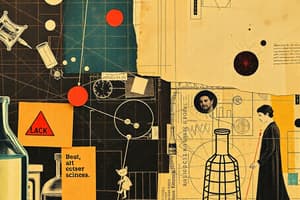Podcast
Questions and Answers
What is an isotope?
What is an isotope?
Atoms of the same element with the same number of protons, but different number of neutrons.
What does the number next to the isotopes signify? e.g. Cr-52
What does the number next to the isotopes signify? e.g. Cr-52
The atomic mass.
How can you tell isotopes apart?
How can you tell isotopes apart?
By their neutrons and atomic mass.
How do isotopes compare in terms of atomic number?
How do isotopes compare in terms of atomic number?
What about atomic mass for isotopes?
What about atomic mass for isotopes?
What about the number of electrons for isotopes?
What about the number of electrons for isotopes?
What about properties of isotopes?
What about properties of isotopes?
What are radioactive isotopes?
What are radioactive isotopes?
How do radioisotopes become stable?
How do radioisotopes become stable?
What are some harmful effects of nuclear radiation? (Select all that apply)
What are some harmful effects of nuclear radiation? (Select all that apply)
What are some beneficial effects of nuclear radiation? (Select all that apply)
What are some beneficial effects of nuclear radiation? (Select all that apply)
How is americium-241 helpful?
How is americium-241 helpful?
What is abundance?
What is abundance?
What is the average atomic mass?
What is the average atomic mass?
What is important to remember about isotopes?
What is important to remember about isotopes?
Flashcards are hidden until you start studying
Study Notes
Isotopes Overview
- Isotopes are atoms of the same element with identical protons but varying neutron counts.
- Each isotope is distinguished by its atomic mass, represented by a notation such as Cr-52.
Identifying Isotopes
- Isotopes differ in neutron number and atomic mass, which can be used for identification.
- Despite differing isotopes, the atomic number (number of protons) remains constant.
Atomic Mass and Electrons
- Different isotopes have varied atomic masses due to differing neutron counts.
- The number of electrons stays the same across isotopes since the number of protons does not change.
Physical and Chemical Properties
- Physical properties are similar among isotopes, except for mass differences.
- Chemical properties remain consistent due to similar electron arrangements in the outer shell.
Radioactive Isotopes
- Radioactive isotopes are unstable and emit high-energy particles as they decay.
- Over time, radioactive isotopes transition into stable isotopes through the emission of these particles.
Effects of Nuclear Radiation
- Harmful effects include damage to living tissues, potential cancer development, and birth defects.
- Beneficial uses of nuclear radiation encompass nuclear power (Uranium-235), fossil dating (Carbon-14), smoke detectors (Americium-241), and cancer treatments (Cobalt-60).
Americium-241 in Smoke Detectors
- Americium-241 emits alpha particles which ionize air molecules in the detector.
- When smoke enters the ionization chamber, it disrupts the electric current, triggering the alarm.
Abundance and Average Atomic Mass
- Abundance refers to the natural occurrence rate of a specific isotope on Earth.
- The average atomic mass displayed on the periodic table is calculated from the weighted average of all isotopes of an element.
Key Takeaways
- Smaller isotopes generally have a higher abundance.
- Always read questions carefully to understand the context before answering.
Studying That Suits You
Use AI to generate personalized quizzes and flashcards to suit your learning preferences.




